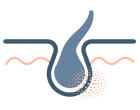Ectodermal Dysplasia Precision Panel
Ectodermal Dysplasias (EDs) are a heterogeneous group of approximately 200 inherited disorders characterized by anomalies in at least two of the structures derived from embryonic ectoderm, with at least one involving skin appendages (hair, nails, sweat glands).




